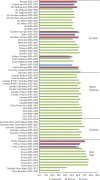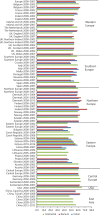Global pattern and trends of colorectal cancer survival: a systematic review of population-based registration data
- PMID: 34486877
- PMCID: PMC8832952
- DOI: 10.20892/j.issn.2095-3941.2020.0634
Global pattern and trends of colorectal cancer survival: a systematic review of population-based registration data
Abstract
This review will describe the global patterns and trends of colorectal cancer survival, using data from the population-based studies or cancer registration. We performed a systematic search of China National Knowledge Infrastructure (CNKI), Wanfang Data, PubMed, Web of Science, EMBASE, and SEER and collected all population-based survival studies of colorectal cancer (up to June 2020). Estimates of observed and relative survival rates of colorectal cancer by sex, period, and country were extracted from original studies to describe the temporal patterns and trends from the late 1990s to the early 21st century. Globally, 5-year observed survival rates were higher in Seoul, Republic of Korea (1993-1997; 56.8% and 54.3% for colon and rectum cancers, respectively), Zhejiang province (2005-2010; 52.9% for colon cancer), Tianjin (1991-1999; 52.5% for colon cancer), Shanghai (2002-2006; 50.0% for rectum cancer) of China, and in Japan (1993-1996, 59.6% for colorectal cancer). Five-year relative survival rates of colorectal cancer in the Republic of Korea (2010-2014), Queensland, Australia (2005-2012), and the USA (2005-2009) ranked at relatively higher positions compared to other countries. In general, colorectal cancer survival rates are improving over time worldwide. Sex disparities in survival rates were also observed in the colon, rectum, and colorectal cancers in most countries or regions. The poorest age-specific 5-year relative survival rate was observed in patients > 75 years of age. In conclusion, over the past 3 decades, colorectal cancer survival has gradually improved. Geographic variations, sex differences, and age gradients were also observed globally in colorectal cancer survival. Further studies are therefore warranted to investigate the prognostic factors of colorectal cancer.
Keywords: Colorectal cancer; cancer registration; population-based study; prognosis; survival rate.
Copyright © 2022 Cancer Biology & Medicine.
Conflict of interest statement
No potential conflicts of interest are disclosed.
Figures
References
-
- Sung H, Ferlay J, Siegel RL, Laversanne M, Soerjomataram I, Jemal A, et al. Global cancer statistics 2020: GLOBOCAN estimates of incidence and mortality worldwide for 36 cancers in 185 countries. CA Cancer J Clin. 2021;71:209–49. - PubMed
-
- Arnold M, Sierra MS, Laversanne M, Soerjomataram I, Jemal A, Bray F. Global patterns and trends in colorectal cancer incidence and mortality. Gut. 2017;66:683–91. - PubMed
-
- Science CHCAoM. Chinese Guideline for Cancer Registration. (2016) ed. Beijing: People’s Medical Publishing House(PMPH); 2016.
-
- Jiang YF, Li ZY, Ji XW, Shen QM, Tuo JY, Yuan HY, et al. Global pattern and trend of liver cancer survival: a systematic review of population-based studies. Hepatoma Res. 2020;6:52.
-
- Pietrantonio F, Morano F, Corallo S, Miceli R, Lonardi S, Raimondi A, et al. Maintenance therapy with panitumumab alone vs panitumumab plus fluorouracil-leucovorin in patients with RAS wild-type metastatic colorectal cancer: a phase 2 randomized clinical trial. JAMA Oncol. 2019;5:1268–75. - PMC - PubMed
Publication types
Grants and funding
LinkOut - more resources
Full Text Sources
Miscellaneous



